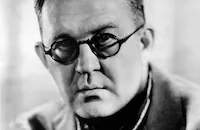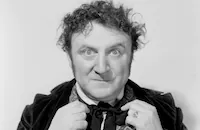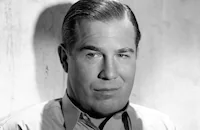Flesh

Brief Synopsis
Cast & Crew
John Ford
Wallace Beery
Karen Morley
Ricardo Cortez
Jean Hersholt
John Miljan
Film Details
Technical Specs

Synopsis
When American Laura Nash is released from a German prison, she is desperate to see her lover, Nicky, but cannot get the money to pay for his release from prison as well. At a beer garden, Karen can't pay for her meal, but is touched by the kindness of the Polikai, a waiter and wrestling champion, who settles the bill for her. Meeting again later that night, Polikai lets Karen stay at his place above the beer garden. Soon Polikai falls in love with her and proposes marriage, through his friend Herman, but Karen still yearns for Nicky, even though she is fond of Polikai. One night Polikai catches her trying to steal his money, but when she explains that she needs it to get her "brother" out of jail, he offers to help her. The next day Polikai brings Nicky back with him. Laura wants to leave with Nicky, but when she tells him that she is pregnant, he sneaks away after telling Polikai that he needs money to go to their sick mother in America. Karen marries Polikai and when her child is born, he thinks that he is the father. Because she is homesick for America, he takes her there, hoping to get the wrestling championship of the world. When Nicky comes into their lives again, Karen is at first cool to him. He sets up a series of crooked matches for Polikai, which he refuses but Laura talks him into it after Nicky slaps her into compliance. Soon Polikai has become a contender for the title, but begins to drink. Laura remorsefully tries to tell him the truth and begins to care for him, but when she tries to sober him up to win a match, Nicky begins to beat her. Just then Polikai wakes up and strangles Nicky. Polikai then wins the grueling match, after which he is arrested for Nicky's murder. Laura visits him in prison and tells him that everyone is behind him and that the district attorney thinks that everything will be all right. She says that she will go away to prevent him from being hurt further, but as their hands clasp, he calls her "Liebchen."

Director

John Ford
Cast

Wallace Beery

Karen Morley

Ricardo Cortez

Jean Hersholt

John Miljan

Herman Bing

Vincent Barnett
Greta Meyer

Edward Brophy

Ward Bond

Nat Pendleton
Charles Williams
Crew
James Brock
John W. Considine Jr.
Arthur Edeson
John Ford
Cedric Gibbons
Edmund Goulding
William S. Gray
Moss Hart
Leonard Praskins
Douglas Shearer
Dave Taggart
Edgar Allan Woolf

Film Details
Technical Specs

Articles
Flesh (1932)
When a hardboiled moll named Laura Nash (Karen Morley) is sprung from a German prison, she is given food and shelter by the burly Polakai (Wallace Beery), an easy-going waiter in a biergarten, who moonlights as a professional wrestler. Polakai is so love-struck and naive that he is blind to Laura's criminal instincts. She convinces Polakai to bail out her lover, Nicky (Ricardo Cortez), and tells the gentle giant that Nicky is her brother. Laura doesn't seem to be a bad woman, and appears to have a genuine affection for Polakai, but she can't stop taking advantage of his kind nature. Pregnant with Nicky's child, she marries Polakai and dupes him into believing the baby is his own. They move to America, where Polakai pursues the wrestling championship of the world. But the couple again falls under the corrupt shadow of Nicky, who becomes Polakai's manager, and encourages him to throw fights rather than win matches. In the end, Nicky learns that Polakai -- in spite of his gullible good nature -- has a will of his own, a discovery that has tragic consequences.
When discussing the art of filmmaking, Ford was always self-effacing. In later years, he would reduce his vast, remarkable career to the simple phrase, "I make Westerns." Even when he was enjoying critical acclaim (as he was at the time of Flesh), he shrugged off any associations between his films and art. According to his son Dan, Ford bragged to producers "that he was a 'money director,' a man who could be counted on to bring in a 'good commercial picture' on time and within its budget. He told Harry Wurtzel that he was 'a journeyman director, a traffic cop in front of the camera, but the best traffic cop in Hollywood.'"
Ford was a reliable maker of profitable films, and ran an efficient set, but he could hardly be characterized as a "traffic cop." He said such things in order to mock his genuine artistic aspirations, which he preferred to keep hidden beneath his crusty exterior. In reality, Ford was strongly inspired by the German silent cinema -- particularly the films of F.W. Murnau -- and that influence is obvious in the fluid camerawork and stark shadows of his films of this period, including Four Sons (1928), Pilgrimage (1933), and The Informer (1935). Visually speaking, Flesh is less dark and moody than Ford's other "Germanic" films, but thematically, it reflects these European psychological dramas. Polakai is clearly cut from the same cloth as several roles played by the great German actor Emil Jannings. In Murnau's The Last Laugh (1924), Josef von Sternberg's The Blue Angel (1930), and E.A. Dupont's Variety (1925), Jannings depicts a proud, upstanding man who suffers a series of personal and professional misfortunes that lead him to humiliation and the brink of destitution. Oftentimes a woman is the catalyst for the downward plunge. The connection between these films and Flesh is clear, but one would have never gotten Ford to admit it.
In spite of these thematic similarities, Flesh isn't all Germanic tragedy. It is also a lively comedy at times, animated by the director's penchant for ribald buffoonery and violent slapstick, which often erupts in Ford's The Quiet Man (1952), Rio Grande (1950), and Donovan's Reef (1963). In fact, one could argue that Beery's performance as Polakai was a prototype for the brash, two-fisted, hard-brawling characters portrayed by Victor McLaglen. And speaking of fun-loving brawlers, Ford stock player Ward Bond makes an appearance as wrestler "Muscles" Manning.
Flesh was intended to capitalize on the success of Beery's boxing picture The Champ (1931), which earned him an Oscar® for Best Actor. As such, it was Beery's film through and through. However, MGM had some degree of difficulty assembling the cast and crew around him. The female lead was first announced as Colleen Moore, then Madge Evans. Just two days prior to filming, Karen Morley stepped into the role of Laura. Edmund Goulding (Grand Hotel, 1932), who wrote the original story, was first slated to direct the film. Months later, Raoul Walsh (White Heat, 1949) was announced as director, who was in turn replaced by Robert Z. Leonard (The Great Ziegfeld, 1936), before Ford took the helm. This sort of pre-production musical chairs was common in the period, as the studio refined its method of factory-style film production that would become its trademark.
Karen Morley would later star in King Vidor's socialist drama Our Daily Bread (1934), about a man and wife who form a farming commune during the Depression. Apparently the film reflected her own idealistic political leanings, as she was named in the House Un-American Activities Committee as a suspected member of the Communist party (actor Sterling Hayden was the informant). Morley evoked the Fifth Amendment, was informally blacklisted from the studios, and never made another film.
According to Hollywood lore, Ricardo Cortez was discovered by the studio heads of Paramount Pictures while he was ballroom dancing at the Hotel Ambassador "with a Los Angeles society girl." Adolph Zukor and Jesse L. Lasky were so intrigued by the light-footed Cortez that they inquired about his acting talents and eventually offered him a five year contract.
Director: John Ford
Producer: John Ford
Screenplay: Leonard Praskins and Edgar Allan Woolf (Dialogue by Moss Hart), based on a story by Edmund Goulding
Cinematography: Arthur Edeson
Production Design: Cedric Gibbons
Music: Alfred Newman
Cast: Wallace Beery (Polakai), Karen Morley (Laura Nash), Ricardo Cortez (Nicky), Jean Hersholt (Mr. Herman), John Miljan (Willard), Vince Barnett (Karl).
BW-97m.
by Bret Wood

Flesh (1932)
Quotes
Trivia
Notes
According to pre-production news items in Hollywood Reporter, Edmund Goulding was initally set to direct the picture. Several months after Goulding was announced as the director, Hollywood Reporter had a news item reporting that Raoul Walsh was to direct the picture, however, one day later the paper published a correction, saying that Robert Z. Leonard, and not Walsh was set to direct. In August 1932, it was announced that Colleen Moore was to co-star with Wallace Beery, making her talking picture debut and her first film in three years. Moore did not make her first talking picture until 1933 when she appeared in the Fox picture The Power and the Glory. In September 1932 it was reported that Madge Evans would play the female lead opposite Beery, and finally, two days before production began, Karen Morley was named as the female lead. Other news items noted that writer Leonard Praskins was having a dispute with M-G-M, thus delaying the start of the picture for several months. A July 29, 1932 news item mentioned Milton Raison as co-adaptor with Praskins, however, the extent of his participation in the completed film has not been determined. Hollywood Reporter also reported that Wladek Zybszko was to be in the cast, however, his appearance in the film cannot be confirmed. This was John Ford's first film for M-G-M. Character actor Nat Pendleton, who has a small part as a bumbling wrestler in the film, was actually an Olympic wrestler and was the World Champion in 1924.














